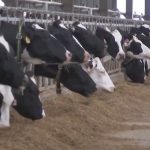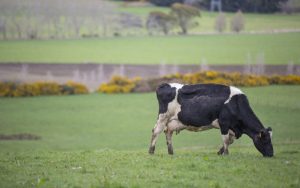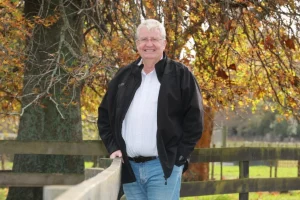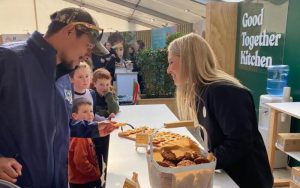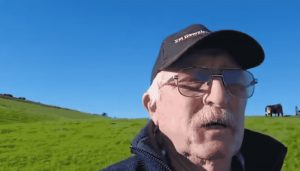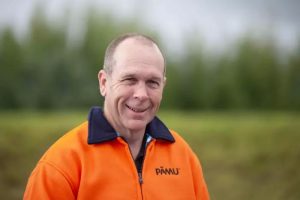
In his 21 years of dairy farming, Shane Wainwright couldn’t remember his last day off or sleep-in during mating.
He used to be up at 4am every season to pick his cows on heat for artificial insemination (AI). Now, he’s up at 6.30am, can skip AI selection, already has two holidays booked for the next six months and saves 50 hours in labour every week.
That all happened since he and wife Bronya won Halter free for a year in June for their 150-hectare dairy farm in South Canterbury with 580 cows.
Halter was a virtual fencing system in the form of a collar which moved mobs of cattle by sounds that guided them from left to right. It also monitored their health, rumination, heat and location.
It meant their cows could walk themselves to the milking shed and onto new feed breaks, all controlled through an app on their phone.
When one of Wainwright’s cows were in calf, he knew he would need to keep a close eye on her, but so did Halter.
While Halter is not a calving detection system, health data from Halter would show him that cow 535 needed attention as her rumination and movement were both down. Five minutes later, Wainwright was helping to deliver the calf with his two children over his shoulder.
Wainwright had seen Halter being used by other farmers, and said he had high expectations which were exceeded.

“When you actually have it on your farm, and your cows are doing what it says and you’re running an app on your phone to move your cows, it’s unbelievable.”
As a result, they had restructured the whole labour system on their farm from two workers to one, which freed up 50 hours of labour a week.
Wainwright said he couldn’t fault the value of a worker on the farm, but it was hard to look past the system when it gave him more time on his hands.
“We’re over the moon at the moment, it’s been an absolute game changer for us.”
When it came to feeding time, Wainwright’s younger stock would struggle against the older, larger stock. He was now able to run two herds on the farm and prioritise the younger stock.
“We always wanted to do it but there just wasn’t enough time. There’d be too many mistakes if we did.
“Now we can get it bang on, 100% every day.”

In their third year of farm ownership, it had certainly given them a helping hand.
“Interest rates doubling, since we bought the place, has really hit home.
“If we can improve our costs somewhere, growing more grass or saving on labour, it’s fitting in really well.”
In the long term, Wainwright said he hoped to see an improvement in their pasture and soil now they could easily back fence their paddocks to keep cows away from areas that had already been grazed.
As Jon Sherlock overlooked his and wife Fiona’s 660ha sheep and beef hill country farm, he said he was “amazed“ at how they’d installed 80ha of virtual fencing in one afternoon.
“It was a bit mindblowing really, especially on hill country. Fencing is not the easiest and it’s pretty costly.
“We’ve fenced 80ha up in an afternoon and we can put a fence wherever we want, whenever we want.”

The Sherlocks were another winner who were not only surprised with the efficiency of the set up, but also with how the system became second nature to their cattle.
“We set them up in a couple of paddocks around the house to monitor them and they seemed to get used to the collars and the cues really quickly. They seem very chilled about the whole thing.”
Another advantage Sherlock planned to use was virtually fencing off his waterways to exclude his stock from sensitive areas across the farm.
“It’s a big major because in the end, it’s better for the animals … it’s better for the people … and I can see major benefits for the environment by getting cattle out of waterways.”
At the tail end of calving for the season, Cameron Te Brake said the system had come at a useful time on his and wife Lizzy’s 450-cow, 137ha dairy farm.

“It’s hard to put a price on it.”
The system made it much simpler for the Waikato family to back fence their paddocks which allowed for better pasture regrowth.
“I was quite surprised how much it grows back in the two days.”

They’d also been down one staff member for the past three to four weeks and hadn’t needed to replace them.
It particularly helped on the wet days, when the last place Te Brake wanted to be was behind a fence reel.
“The most gains are gonna be on a wet day, when you don’t want to go into a paddock and wind a fence up.”
Alongside an extra cup of coffee in the morning, Te Brake said they now had an extra hour or so on their hands, and hopefully more in the future to get the most out of the system.
“It’ll be pretty cool to see what we can do in the next four to six weeks, being able to fully feed them every day with a touch of a button.”
You can now read the most important #news on #eDairyNews #Whatsapp channels!!!
🇺🇸 eDairy News INGLÊS: https://whatsapp.com/channel/0029VaKsjzGDTkJyIN6hcP1K


